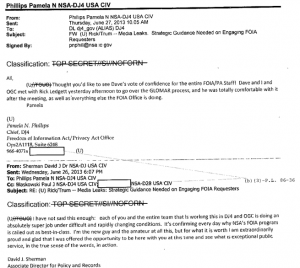Causing Exceptionally Grave Harm to National Security by FOIAing FOIA Process
Jason Leopold has a new article at the Guardian based off a FOIA of NSA’s FOIA process. Perhaps the funniest part of the documents he received, however, is the number of times the NSA claimed its own discussion of FOIA process — including praise for the FOIA responders! — was Top Secret, suggesting revealing details would cause exceptionally grave harm to national security.
That said, I think there’s a missing piece to this puzzle (and hope Leopold pursues it when he makes his inevitable appeal of some of these redaction decisions).
On June 11, NSA’s Chief of FOIA Office Pamela Phillips raised the possibility of having “a paper or sheet of unclassified facts that could be provided to the public.” (See PDF 1) She repeated that request on June 17. (See PDF 3) I believe that is separate from the efforts to come up with a standard Glomar letter (that discussion, incidentally, is redacted in some enormously interesting ways).
But I’m particularly interested in a redaction in an email from Deputy Chief of Staff Trumbull Soule to Associate Director for Policy and Records David Sherman and then Media Leaks Task Force head and now Deputy Director of NSA Richard Ledgett, and cc’ed to Phillips and (among at least 12 others) NSA General Counsel Raj De on June 26.
That’s because that email got sent on the day after the NSA had to pull what I believe was that unclassified fact sheet, which NSA first posted on June 18, after Ron Wyden and Mark Udall wrote a letter, on June 24, to Keith Alexander noting two problems with the letter, in that it misleadingly suggested,
- NSA had the ability to determine how many Americans had been collected under Section 702
- NSA may not search on the records of Americans (back door searches)
In addition, the letter had a classified attachment that, I suspect, noted that John Bates’ response to the upstream problems did not require the destruction of entirely domestic communications.
NSA withdrew the fact sheet from its website sometime before 1 PM on June 25.
Now, it may just be a coinkydink that the highest level of discussion among these emails come on that particular day (though I assume NSA withheld a bunch of emails). But I do find the timing rather interesting.


In all seriousness, I think it’s time to demand a national holiday in honor of Congressman John Moss, who fought tirelessly for 12 years to have the Freedom of Information Act passed. What would we do without it?
quote”In all seriousness, I think it’s time to demand a national holiday in honor of Congressman John Moss, who fought tirelessly for 12 years to have the Freedom of Information Act passed. What would we do without it?”unquote
In all seriousness…
a. Revolt?
b. The 41% of Americans who think Snowden is a traitor would say… http://i.imgur.com/KDlcS.gif
c. See a.
quote”Now,it may just be a coinkydink that the highest level of discussion among these emails come on that particular day (though I assume NSA withheld a bunch of emails). But I do find the timing rather interesting.”unquote
Doggonit..there’s another one of those pesky coinkydinks. You’d think the NSA would use some anti-coinkydink spray or sompthin. (insert rollingeyes smiley)
I submit, NSA dumbfucks never heard of cognitive dissonance.
So what if 41% think Snowden is a traitor? More importantly, how many of those 41% still agree with Snowden’s premise that the American people–not the President, and not the NSA–have the right to determine whether or not they want their own government spying on them for no legitimate purpose? If mere numbers were all that was important, we wouldn’t have the USA today, because the majority of citizens living in America in 1776 disagreed with the revolutionaries and wanted to remain vassals of Britain.
I always wondered what would happen if some Judge somewhere asked a DOJ attorney, at oral hearing, to define “exceptionally grave harm to national security”. I can see it now:
‘Counselor, please give me examples of “harm”, of “grave harm”, and of “exceptionally grave harm”. And please tell me whether “grave harm” means that the country is quite possibly going to die as a result, just as “grave condition” for a human patient means that the patient is quite possibly going to die soon. if so, then explain to me how “exceptionally grave” can be worse than plain old “grave”. And if not, then you really, really need to convince me that you are not trying to intentionally mislead this Court by using such hyberbolic language. … You may speak now.”
Sadly those Judges are stuck in traffic Court. Need to change the oath people take to serve our Country by removing “uphold Constitution” and inserting “protect (multi) National (corporate) Security.”
Commenting on this statement in your “Twitterverse” sidebar. “Trent Franks appears to have reason to believe electromagnetic pulse weapons pose serious threat to power grid”. Where I live, there are many, many power plants and substations wide open and accessible from roadways that run right past them. Any group with the right weaponry (old-fashioned projectile launchers, not death rays) could easily take them out en masse. I assume the rest of the country is like this. Are there any funds sought in the Intel bill for erecting impregnable 100-foot walls (in our lovely neighborhoods!) around all these things? Or for preventing home-made drones from carrying incendiary devices into them?
Just askin …